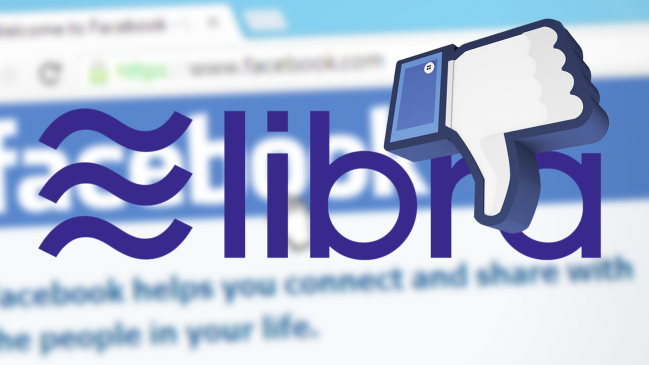Facebook Disputes FT’s Claim that Libra is ‘Not a Proper Blockchain’
June 19, 2019 by Jon Southurst
Facebook has hit back at claims in the financial media that its proposed cryptocurrency “Libra” is not a true cryptocurrency. The company told writers and editors at FT.com’s online Alphaville publication that its technology is indeed a blockchain, and that reporters should seek its guidance before making an assessment.
Also read: Review: Hash Altcoin Blackminer F1 FPGA Cryptocurrency Miner
Subscribe to the Bitsonline YouTube channel for great videos featuring industry insiders & experts
Libra Has Neither Blocks Nor Chains: FT
FT Alphaville has published a series of articles titled “Breaking the Zuck Buck”, which takes a critical look at the features (and shortcomings) of Facebook’s much-publicized cryptocurrency concept.
One article in particular raised the company’s ire: “Facebook’s Libra: Blockchain but Without the Blocks or Chains” by Jemima Kelly. In the piece, Kelly first questioned why Facebook even needs to build a blockchain-based cryptocurrency for its purposes, and noted that Libra lacks the characteristics that would make a blockchain… a blockchain.
From the Libra white paper, Kelly quoted:
“Unlike previous blockchains, which view the blockchain as a collection of blocks of transactions, the Libra Blockchain is a single data structure that records the history of transactions and states over time.”
She then made the observation that if Libra is unlike previous blockchains, particularly in its fundamental structure, then it’s more an attempt to redefine what a blockchain is than to produce an example of it. Kelly made the following analogy:
“Unlike previous loaves of bread, which view the loaf of bread as a collectively baked set of ingredients, the Libra Loaf of Bread is a single ingredient structure that bakes the components sequentially over time.”
Kelly also noted the term “blockchain” itself doesn’t have a definition that 100 percent of the cryptocurrency community agrees upon, so therefore Facebook’s argument is similar to the one often leveled against Ripple. Ripple validates transactions and verifies balances using a consensus network, and is frequently referred to as “not a blockchain” by cryptocurrency commentators.
Facebook responded to the critique in an email to FT Alphaville editor Izabella Kaminska, arguing that Kelly’s article contained factual errors which should have been checked with Facebook’s technical representatives for clarification before publishing.
LIBRA THREAD: Facebook is disputing @jemimajoanna ‘s post about Libra not being a proper blockchain. They say it is. We’ve entered a nauseating theoretical discussion now about what constitutes a blockchain. They cite the Walport report definition as evidence that it is….
— Izabella Kaminska (@izakaminska) June 19, 2019
Facebook’s Information Should Stand on Its Own
Speaking to Bitsonline, Kaminska said Kelly wrote her article based on Facebook’s own detailed information — which should have been enough for an experienced reporter to make an assessment. Additionally, others had made similar critiques.
“Facebook got in touch with us citing factual errors in Jemima’s story on the basis of her interpretive analysis which critiqued the notion that libra was actually a blockchain or a cryptocurrency. But what Jemima wrote was entirely based on the core materials published by Facebook. No misrepresentation occurred. To suggest her interpretation was a factual error — especially given she hasn’t been the only one to make such observations — was truly bizarre.”
“As is common practice in the industry, the FT received the libra material on embargo terms days ahead of the official release with a list of approved contacts to approach for exclusive briefings. It was Facebook’s contention that Alphaville, an online-only editorial subdivision of the FT, should have used that contact list to get proper guidance on how to interpret the published materials. But, it is our contention, a white paper should be able to stand for itself. If one needs a corporate overseer to guide interpretation and implementation to this degree, there’s either a problem with the clarity of the thinking behind the document or purposeful obfuscation going on.”
Could Alex Jones Run a Libra Node?
In a series of tweets, Kaminska asked whether Alex Jones — the controversial broadcaster whose network Infowars has been wiped from most social networks — would be allowed to operate Libra nodes. That would be “an easy way to test” if Facebook’s system met its own standards of what constitutes a blockchain.
Facebook referred to a 2015 report on blockchain and distributed ledger technology (DLT) by the U.K’s chief scientific adviser Mark Walport (PDF link) for its interpretation of the terms.
That blockchain definition reads: “a digital database containing information (such as records of financial transactions) that can be simultaneously used and shared within a large decentralized, publicly accessible network.”
— Izabella Kaminska (@izakaminska) June 19, 2019
That definition includes the statement “a digital database containing information (such as records of financial transactions) that can be simultaneously used and shared within a large decentralized, publicly accessible network”.
Given that, Facebook’s blockchain may have other issues apart from how its blocks and chains are formed — if it’s decentralized and publicly accessible, then that would include all those banned from Facebook’s social network… and in theory, be open to an attack from them.
But there are rules for who may access the network as a node operator:
LIBRA THREAD UPDATE: it is interpreted that Alex Jones would not meet the criteria for becoming a Libra node (unless Infowars has $10m and a $1bn valuation or $500m in customer balances) during the (potentially endless) permissioned period. https://t.co/Ve4fL0Hkx9
— Izabella Kaminska (@izakaminska) June 19, 2019
A lack of blocks Libra’s “enterprise nature” would make it an example of DLT, not a cryptocurrency or blockchain, Kaminska concluded.
Corporate Blockchains and Marketing
As a powerful corporate entity proposing a “cryptocurrency” and/or “blockchain”, Facebook exposes itself to a range of opinions and criticisms from existing industry participants. Many of those participants would find a system that wasn’t open to all participants, or one where overall development is directed according to corporate needs, objectionable.
It also appears that Facebook expects those criticisms and may be sensitive to them. It also seems determined to promote Libra as a cryptocurrency.
Others pointed out that Facebook’s partners in the Libra venture include Mastercard, VISA, PayPal, Coinbase, and Stripe — entities which have not always supported cryptocurrencies or their communities in their push for alternative financial systems (to put it mildly). Indeed, several of these companies have been on the Bitcoin community’s villains list for years.
Ultimately, Libra’s’ fundamental nature as a technology, and who may use it, will play a large part in its future adoption — whether it becomes popular or not. Meanwhile, cryptocurrency proponents will continue building alternatives outside the system. The debate, at least, is set to continue for a while.
What’s your take? Is Facebook Libra a blockchain or something else… and how much does it matter? Feel free to discuss in the comments below or on social media (if you’re allowed to use it).
Images via Facebook, Pixabay





